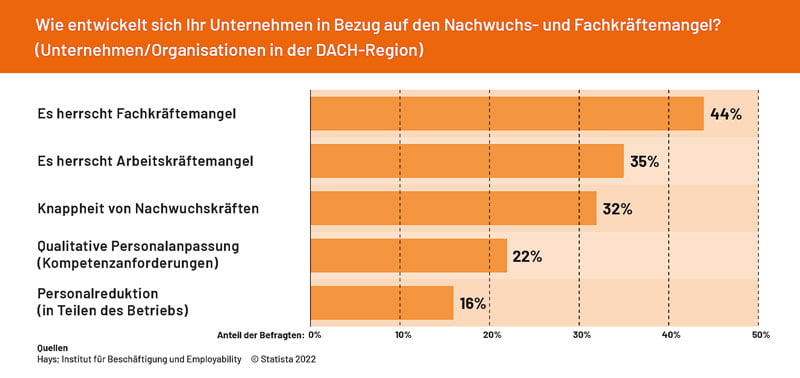Not Replace, but Support


Skilled workers vs. technology
The Hays Institute for Employment and Employability has determined for the DACH region that 44 percent of the companies surveyed are suffering from a shortage of skilled workers; 35 percent complain about labor shortages and 32 percent talk about a shortage of junior staff.
Another factor not considered in the survey, however, is the issue of work-life balance and the associated development of available working hours. In practice, more and more employees are reducing their activity from a 5-day week with 100 percent working hours (FTE = 100) to a 4-day week with, for example, 80 percent or less working hours (FTE ≤ 80).
The software company Kern AG from Freiburg is also currently experiencing this change among its employees. Managing Director Eckhard Moos sums it up dryly: "Behind the encouragement of work-life balance is, in effect, the trend 'from work to life,' with the effect of decreasing cumulative FTE at constant headcounts."

Increase productivity
This controller formula captures sometimes violent changes. Every employee is personally entitled to the 4-day week, but the company immediately loses 20 percent of the working time available up to that point. In a knowledge society based on the division of labor, the actual decrease is likely to be even greater: The costs of coordination (with colleagues and business partners) increase; with constant setup time, productive time decreases because of the formula "productive time = working time - setup time"; the ratio of setup time to productive time increases arithmetically and deteriorates in business terms. The loss of value-adding working time of 20 percent or more is a very severe impact on the production process as a whole. For the technical industry, it is part of its business to respond to dwindling production factors with productivity increases and to respond with innovations. In this respect, it is superior to the knowledge and, in particular, the consulting industry. But how can productivity be increased in the consulting business?

Jean-Christophe Spenlé, head of the consulting department at Kern AG, agrees, because consulting in general and consulting in the triangle of business administration, business processes, SAP is particularly complex. Spenlé takes the idea further, pointing out that personalities with the appropriate soft skills, the necessary intellect and good communication skills are in very short supply. You would like to have more of people with these skills, but instead you get even less (working time) from them because of part-time work.
Nevertheless, Spenlé sees an opportunity to maintain and strengthen the creative power of his consulting department. Assuming that everyone is already working efficiently, they can keep their work performance at (at least) exactly the same level if they are given productivity-enhancing tools.
SAP-integrated module box
For Eckhard Moos, this task is the entrepreneurial attraction. In doing so, he is guided by his clear basic rule: "It's better to have an effective personality on board, even under part-time conditions, than not to have them on board at all."
Following the concept of "identify, model, implement", Kern AG has taken up the principle of Artificial Intelligence ("identify data patterns and how to apply these patterns to the real world") and developed it further as Process Intelligence: "Identify process patterns and how to apply these patterns to the real world." The result is the SAP-integrated application Allevo Orbit.
The new solution is organized in such a way that business management actions and business processes can be broken down into their smallest parts. For these small parts, there are prefabricated "equal-part" building blocks. So once the consultants have identified the process pattern, they take Orbit's building blocks and put them together in equal parts to form an SAP-integrated process. Orbit organizes the process flow internally and finally delivers the result.
Allevo Orbit can be thought of as an SAP-integrated building block box with many bricks that can be plugged together and combined to create ever new processes. The uniformity of the components makes the process accessible, simple and fast. Consultants increase their productivity and scale their performance. "This is our corporate contribution to work-life balance. This is what tools for increasing the productivity of knowledge workers look like"explains Moos.
Thanks to Allevo Orbit, Kern AG sees an opportunity to make the consultants at its two Solution Centers Logistics and Controlling faster, more flexible and more effective. As part of an SAP-integrated application, all consultants will benefit from the new technology. Allevo Orbit is currently being put through its paces and subjected to tough practical tests with customers in ramp-up projects.
"Of course, we come up with new ideas at all ends and also bump into corners, which we then eliminate"says Eckhard Moos. "But the concept passes every test and already confirms its potential today."
Cast in software
Looked at closely, this is neither a miracle nor an unexpected turn of events, but only consistent, because Kern AG ultimately did something completely logical: It took advantage of its more than 25 years of SAP know-how and evaluated its experience from SAP projects. It modeled this knowledge according to the criteria of Process Intelligence and cast it in software. "We give our customers a tool that allows them to do many more tasks in the same amount of time, or the same tasks in less time"sums up Eckhard Moos.







